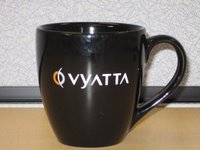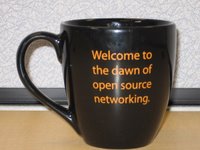When we first started Vyatta (even before it was called Vyatta), we gathered a group of friends together to let them know what we were up to and get their input on features and direction. We jokingly called that group the Secret Society. Since we had no offices for the first several months of the company's existence (not until February 2006, to be exact), we held these events in restaurants, bars, and our VC's offices. (The least you can do for your VCs after funding is buy them drinks with their own money.)
When we finally went public in February, we talked about whether we should continue with the Secret Society or not. We agreed that the events were more than just a way to get feedback from people and also more than simply a party, some sort of fusion of the two that seemed pretty important to our culture to keep.
You see, open source, by its nature, is collaborative. In contrast to a closed-source company where the only contributors sit within a 10-cube radius of each other, open source seeks out the best talent, where ever it can be found, globally. Allan mentioned Joel Krauska the other day. Joel lives in the San Francisco Bay Area. But Hasso Tepper has been contributing bugs and comments for more than a month and is a big XORP and Quagga contributor. Hasso lives in Estonia. Kristian Larsson, also a big XORP contributor, has given us plenty of feedback. Kristian lives in Sweden. Eventually, we'd like to connect names with the living, breathing faces behind them. The Secret Society events give us a mechanism to do that.
Yes, I know what you're saying, because some of you said it about 10 nanoseconds after I sent out an event invitation last night: "Dave, thanks for invite, but you guys are in San Mateo, California, USA. I'm here in [insert distant location]." Well, that's true. We can't get everybody in one place at one time, but eventually we see Secret Society parties going on the road (with one already in the planning stages that I'll tell you about in a second), as well as local "chapters" springing up.
Whew! So if you have read this far, you're thinking, "Get to the point." Here's the point:
We'd like to invite y'all (as our graphic designer, Katie says) to the first post-launch Secret Society event. The details are:
Location: The Vyatta Bunker, San Mateo, CA, USA.
Date: Tuesday, March 28, 2006
Time: 5:30 PM PST
We'll have drinks and food and a little bit of Vyatta schwag. If you think you might be interested, please drop me an email so I can get an approximate count for food/drinks. My email address is "dave" at vyatta.
If you aren't yet a member of the Vyatta Secret Society, joining is as simple as filling in the registration form on our site.
Now, I'll say that we're also planning a Secret Society event at Interop, Las Vegas, in May (show dates are May 2 - 4). If anybody is going to be there and is interested in attending, again, send me an email at "dave" at vyatta so I can get an approximate count. I'll send out details to the Secret Society mailing list as we get closer to Interop.
Finally, let me conclude by saying that I think people who see open source simply as "free software" miss the point. Open source is about setting the code free so that people, where ever they are located, can shape its future. It's that participation that creates community. And true community demands more than people typing on keyboards around the world. It demands people coming together, in person, looking in each others eyes, and agreeing to move the world forward. I hope to see you here.









